
United Nations: Secretary-General Ban Ki-moon has warned that an increase in tensions between Lebanon and Israel could lead to a new conflict with potentially devastating consequences.
In a report to the UN Security Council, Ban accused both countries of violating the 2006 ceasefire resolution that ended the 34-day war between Israel and Hezbollah in southern Lebanon.
The UN chief said Hezbollah continues to maintain "a substantial military capacity" in violation of UN resolutions and an arms embargo, and he again called for Hezbollah and other militias to be disarmed "through a Lebanese-led political process."
Ban said Israel continues to violate the ceasefire by conducting daily overflights of Lebanon and refuses to withdraw from the disputed northern border village of Gajar.
The secretary-general said that both sides have violated the UN-drawn Blue Line separating them.
Ban said Israeli accusations in April that neighbouring Syria had provided Scud missiles to Hezbollah _ an allegation later raised by US officials - "greatly increased tensions" between Israel, Lebanon and Syria. Lebanese and Syrian authorities categorically denied any missile transfers.
Hezbollah's secretary-general would neither confirm nor deny that the militia had acquired such weapons and stated that the militia was prepared to respond to attacks from Israel, Ban said.
"Rhetoric escalated rapidly, creating a perception in the public that a resumption of conflict was imminent," the secretary-general said.
For the moment, he said, tensions appear to have subsided, due mainly to messages from Syrian and Israeli officials that "a confrontation was not desired," as well as diplomatic actions by Lebanese Prime Minister Sa’ad Hariri, several Arab and European government, the US and the UN.
Nonetheless, Ban said, the increase in tensions "raised the specter of a miscalculation by either party leading to a resumption of hostilities, with potentially devastating consequences for Lebanon and the region."
The summer 2006 war, which left some 1,200 Lebanese and 160 Israelis dead, ended in a stalemate.
Israeli officials have said they believe Hezbollah has managed to triple its prewar arms stockpile to more than 40,000 rockets some of which can hit anywhere in Israel.
Ban expressed concern at reports of armed groups operating in southern Lebanon in violation of the UN resolution.
But he said the UN peacekeeping force in the south, known as Unifil, "has neither been provided with, nor found, evidence of the unauthorised transfer of arms into its area of operations."
The secretary-general expressed concern at several attacks aimed at Unifil forces. UN diplomats said at least one troop contributing country has asked the Lebanese government to deploy more troops to the south.
Ban said both sides have a responsibility to address all outstanding issues "in order to reach a permanent ceasefire and a long-term solution" as called for in the 2006 resolution.
"At the moment, they are not doing enough in this regard," he said.
The secretary-general reiterated that the 13,000-strong UN force "cannot be maintained indefinitely" and he urged both sides to take advantage of its presence "to make tangible progress ... in the coming months."











